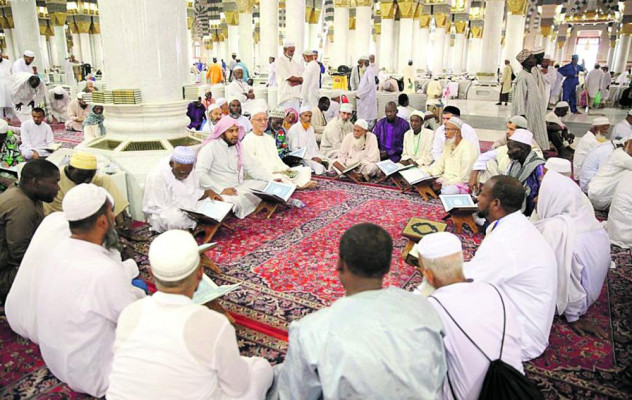Current Section: model

Lesson Contemplation & Exegesis of the Quran
Exegesis and Contemplation of the Quran
Every Muslim should be keen to read the Holy Quran correctly, reflect upon it, contemplate its meanings, commands and prohibitions, learn its interpretation and rulings, then act upon it to achieve happiness in this world and the Hereafter.
Meaning of Tadabbur (Contemplation)
The word "tadabbur" refers to stopping with verses and reflecting and interacting with them in order to comply with them and benefit from their meaning.
A one who contemplates Quranic verses must do so in light of their overall meaning in order for their contemplation and understanding to be correct.
Significance of Contemplating the Quran
Every Muslim should contemplate this majestic Quran and understand and appreciate its verses and meanings and live with it. Allah the Exalted says: ([This is] a blessed Book which We have revealed to you, [O Muhammad], so that they might reflect upon its verses and that those of understanding would be reminded.﴿ [Saad:29] And He also says: (Then do they not reflect upon the Quran, or are there locks upon [their] hearts?﴿ [Muhammad:24]
Exegesis refers to the explanation of the meanings of the Quran

Importance and Need for Tafseer (Quranic Exegesis)
The science of Quranic exegesis is one of the most noble and beneficial sciences within Islam; it is connected with the Book of Allah the Exalted and aids in understanding the Allah's Speech and its meaning. Quranic exegesis is the means through the meanings of the Quran are understood, thereby helping guide Muslims to good actions, attaining the pleasure of Allah the Glorified and Exalted, and achieving His Paradise. A Muslim achieves this by: -Doing what Allah commands in His Book -Avoiding its prohibitions -Taking lesson from its stories -Believing in its accounts Quranic exegesis enables Muslims to distinguish truth from falsehood and remove any ambiguity in reaching the intended meanings of the verses and their actual implications.
The Companions' Diligence in Understanding the Meanings and Explanation of the Quran from the Prophet ﷺ
The honorable Companions (may Allah be pleased with them) would ask the Prophet ﷺ about that which would be difficult for them to understand in the Quran. Abdullah bin Masud (may Allah be pleased with him) narrates: When this verse ﴾They who believe and do not mix their belief with injustice﴿ [Al-An'am:82] was revealed, it was difficult for the companions of the Prophet ﷺ to understand, so they asked: 'Who amongst us has not wronged themselves?' The Prophet ﷺ replied: «It is not as you are thinking. Rather it is as Luqman said to his son: ﴾"O my son, do not associate [anything] with Allah. Indeed, associating partners [with Him] is great injustice."﴿ [Luqman:13].» (Al-Bukhari 6937, Muslim 124)
Quranic exegesis and understanding its meanings can be accomplished through the following ways:
1. Quranic Exegesis Through the Quran
This is a valid method of exegesis because Allah is the One who sent the Quran, and He knows best what He intended.
An example of this is Allah's verse: ﴾ Unquestionably, [for] the friends of Allah there will be no fear concerning them, nor will they grieve Those who believed and would fear Allah﴿ [Yunus:62-63]. Allah explained the phrase Awliya Allah (i.e., friends of Allah) through His saying in the following verse: ﴾Those who believed and would fear Allah﴿
2. Quranic Exegesis Through the Prophetic Sunnah
This method of exegesis is valid because the Prophet ﷺ was communicated on behalf of Allah the Exalted. He is the most knowledgeable of people about what Allah intended from His Speech.
Among the examples of this: The Prophet's ﷺ interpreting the word "Quwwa" (i.e., strength) with the word "Al-Rami" (i.e., shooting/archery). 'Uqbah bin Amir (may Allah be pleased with him) narrates: I heard the Messenger ﷺ saying while he was on the pulpit: «﴾And prepare against them whatever you are able of power﴿ [Al-Anfal:60]. Verily, strength is in archery, strength is in archery, strength is in archery» (Muslim 1917).
3. Quranic Exegesis of the Prophet's Companions (may Allah be pleased with them)
Their exegesis is valid because they are more knowledgeable about the Quran than those who came after. They witnessed the contexts and conditions in which the verses were revealed. They also possessed a comprehensive understanding, authoritative knowledge, and virtuous deeds.
An example of their exegesis is regarding the verse of Allah the Exalted: ﴾And if you are sick or traveling or one of you returns from relieving oneself or you have touched women﴿ [An-Nisaa:43]. It is authenticated that Ibn Abbas (may Allah be pleased with him) that he explained the touching of women as referring to sexual intercourse (Tafsir At-Tabari 8/389).
4. Quranic Exegesis of the Tabi'een (generation after the Prophet's companions)
They are those who devoted themselves to learning and preserving the Quranic exegesis of the Prophet's companions (may Allah be pleased with them) because the generation after the Prophet's companions are the best of people after the Prophet's companions. Therefore, they are more safeguarded from their whims than those who came after them. Additionally, the Arabic language had not changed much during that period, so they were closer to the truth in understanding the Quran than those who came after them.
A Muslim's Obligation With Regards to Quranic Exegesis
A Muslim who encounters difficulty in understanding something from the Quran or comprehending its meanings must refer to the authoritative books of Tafsir (Quranic Exegesis) and the commentary of the Quranic exegesis scholars to help clarify and explain the meanings of the verses and their interpretation.
Interpreting the verses of the Quran is not for all Muslims. Rather, it is a task reserved for scholars within the field of Quranic exegesis. Therefore, the average Muslim should not interpret the Quran without sufficient knowledge and academic training. A scholar of exegesis interprets on behalf of Allah the Exalted and bears witness to what He intended from His speech. Therefore, one must take the magnitude of this testimony in earnest and fear saying something about Allah without knowledge and falling into something Allah prohibited. Someone who engages in this will be disgraced on the Day of Resurrection. Allah the Exalted said: ﴾Say, “My Lord has forbidden shameful acts done openly or in secret, sinfulness, unjustified aggression, associating partners with Allah for which He has not sent down any authority, and saying about Allah that of which you have no knowledge”﴿ [Al-A'raf:33].
Several books are authored in the field of Quranic exegesis, and they are not all on the same level of academic authority. Therefore, a Muslim must rely on authoritative works whose authors adhere to the principles of Quranic exegesis. Prominent works in Quranic exegesis include:



